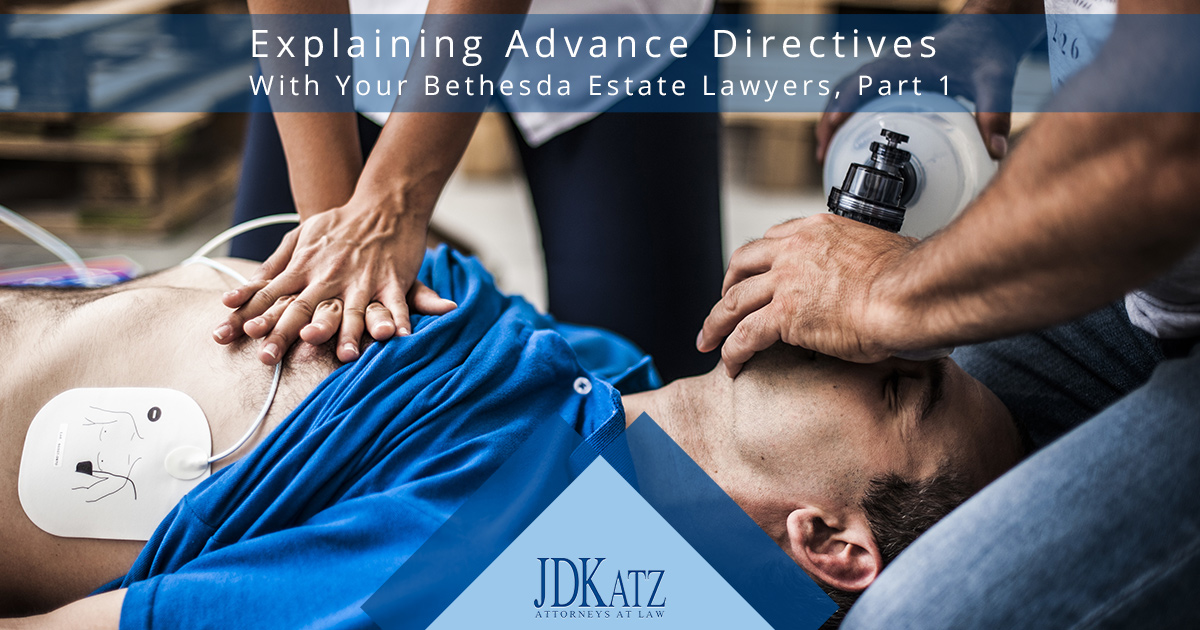
In our modern world, you can never know for certain how your life will go or how it will end. We all hope for productive and healthy lives, yet there is no guarantee that can protect from sudden life changes. One scenario where this can prove to be terrifying and true is when you are incapacitated and medically unable to make your own decisions. Nobody wants to consider this scenario, but putting a plan in place for such an outcome can do much to ensure that your wishes are upheld. The same plan can also be in place for the end of your life, when advanced age creates additional health concerns. One aspect of estate law that can account for this scenario is an advance directive. It’s important to include an advance directive in your estate plan to better protect your family and your assets in case you become incapacitated. It’s important to seek out legal professionals such as our estate lawyers in Maryland.
JDKatz is comprised of the best criminal, tax, and estate planning attorneys in Bethesda and D.C., utilizing our years of experience and wide skill base to work to provide the best outcomes for our clients. Our team is here to help you navigate the complex field of estate law to create a cohesive and comprehensive plan for all of life’s events. Today, we’ll highlight what an advance directive is and a few beneficial facts surrounding its purpose. When finished, be sure to contact our estate planning lawyers to begin your journey.
What is an Advance Directive?
An advance directive is a tool that communicates your wishes between the legal and medical worlds. Essentially, this document serves to deliver your final wishes to legal experts and medical providers in addition to your close family members for how you are to be cared for. Advance directives are intended for use for individuals who are not able to clearly communicate their wishes. Many people refer to an advance directive as a living will.
Your advance directive can include all of your contingencies for last wishes, including:
- Use of resuscitation efforts such as CPR
- Feeding tubes for survival on life support
- Life support devices such as ventilators
- Medication for pain and symptom management
When Does an Advance Directive Take Effect?
Before your living will becomes valid, it must meet a few a few requirements. In most cases, two valid physicians must validate that you are unable to make medical decisions and that you are afflicted with a medical condition that meets Maryland’s laws governing living wills. Individuals who are in a coma, for example, meet these criteria.
A living will can become valid as soon as it is signed or it can be enacted when a patient is completely unable to relay his or her wishes to the medical staff. Regardless of the conditions of your living will, health care professionals will rely on verbal communication with you as long as possible regarding medical decisions.
How Do I Create an Advance Directive?
We advise that you seek out a local estate planning attorney for assistance when drafting your living will. Remember that no one form is the correct one, and that your documentation can vary as long as the requirements are present on the page. Your advance directive will need to be signed in front of two witness who will each sign the form for confirmation. The state of Maryland does not require notarization. You can make copies of your living will, as they are just as valid as the original.
Is My Living Will Valid Across the United States?
The simple answer is yes. An advance directive should be valid anywhere in the US. However, it’s important to remember that your document may not work across state lines. The degree of your success in this matter will depend largely on the state you visit, as some states will accept outside living wills while others may accept it if the document is close to their own requirements. It can be very challenging to keep abreast of all of the contingencies in place amongst states and living wills. If you spend a lot of time in other states, we recommend drafting an advance directive for each state to ensure compliance.
Can My Advance Directive Expire?
No. Your living will, once signed, will remain in effect for your lifetime. You can change your advance directive at any time, however. Once you have created a new living will, the older version will become invalidated. If you have questions about this aspect, be sure to speak with our trust and estate professionals.
While nobody wants to consider an outcome where they are unable to make their own decisions, it’s important to take the steps to protect yourself. Next time, we’ll continue this topic by looking more into living wills and the power of your health care agent. If you’re worried about your will and estate, be sure to reach out to our estate planning attorneys in Bethesda for assistance. JDKatz staffs the most experienced estate lawyers in Maryland, creating personalized solutions for each of our clients. Contact us today to learn more or to begin your estate plan.


